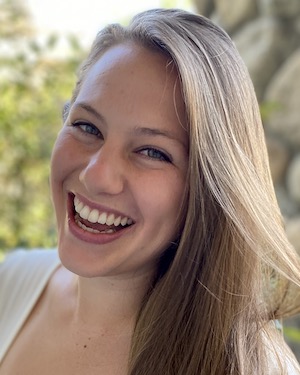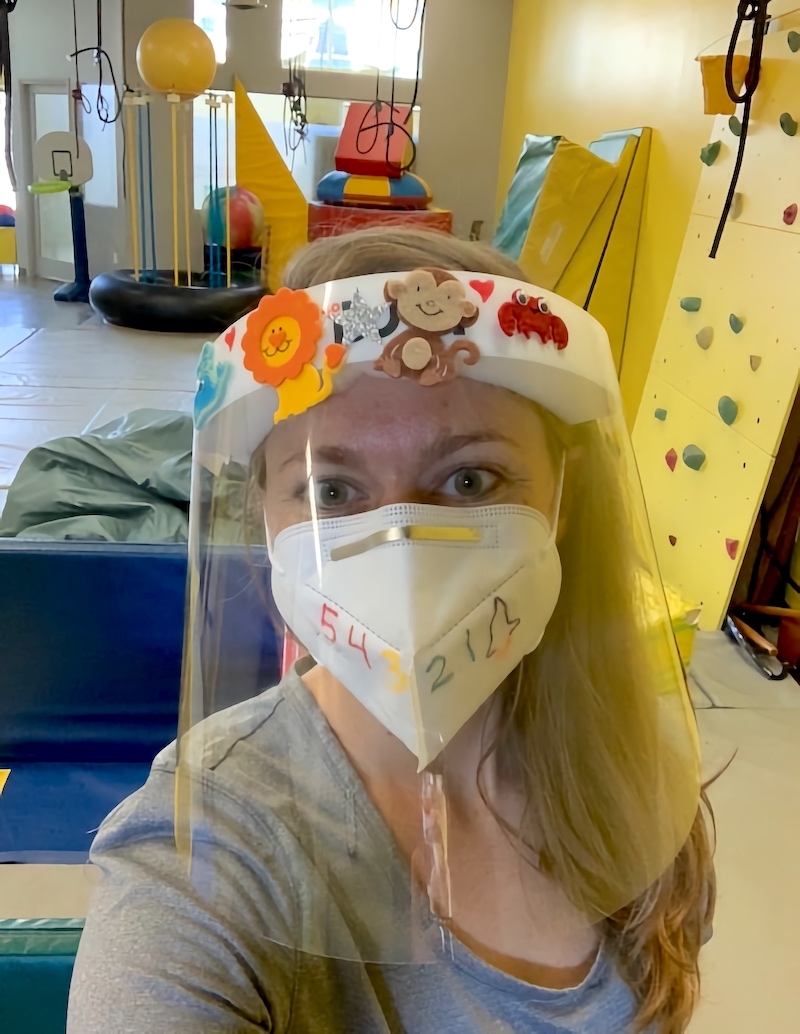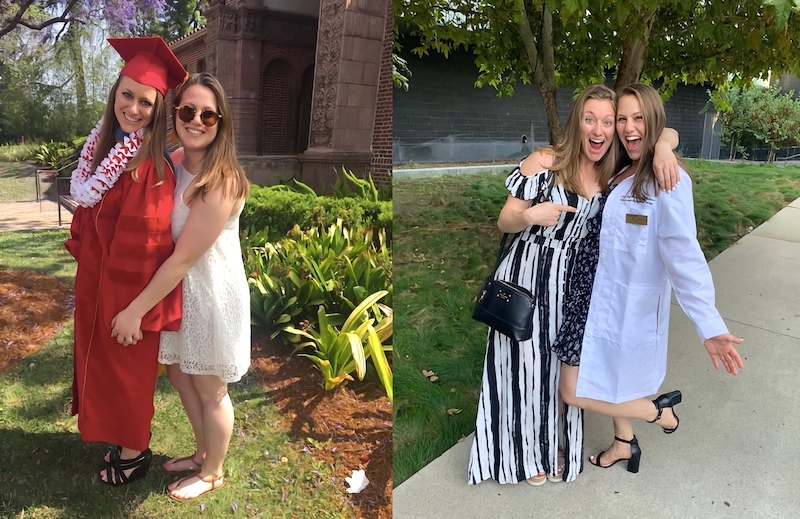Interview with Pediatric OT Dani Lurie OTD, OTR/L

October 21, 2020
by Savi
This weekend I got the opportunity to sit down with my sister Daniella Lurie OTD, OTR/L, or Dani Lurie, and learn more about her time at USC and her journey to becoming a pediatric occupational therapist. Throughout my lifetime I have had the privilege of accessing my sister’s life experiences and advice. These have been integral to my success as a current student and I thought it would be valuable to share some of her words of wisdom with you all! Dani graduated from USC Chan with her Doctorate in 2017 and has been working in pediatrics ever since. She currently works in a pediatric occupational therapy clinic and conducts treatment sessions both in person and through telehealth. Below you will find Dani’s responses to my questions. A huge shout-out to my biggest role model for taking the time to share her valuable insight with me and with all the future occupational therapists reading.
Why did you pick Occupational Therapy (OT)?
I have always been interested in working with people and was excited that OT combines both science and social science and focuses on mental and physical health. I volunteered in pediatric clinics during my undergraduate career at UCLA and that solidified my love for working with children and their families. All of my courses in college focused on developmental and abnormal psychology as well as statistics. I grew to love all of these subjects and was thrilled to realize how integrated all of these concepts were in OT. OT incorporates statistics into research and goal tracking, as you need to evaluate patients’ progress in a statistical manner. I enjoy that there is a quantitative reason for everything we do and there are science and research backing our treatment approaches and techniques. OT beautifully combines both my passion for science and my desire to work with people to help them achieve their goals.
Why did you choose to work in Pediatrics?
I worked with kids for my whole life. Whether it was tutoring, instructing dance classes, babysitting, or volunteering, I always found myself gravitating towards jobs that allowed me to work with children from high school onwards. I enjoy that children keep you grounded because they live in the present moment, whereas adults are always on the go thinking about what’s next. The goal for any type of work with kids is surrounding play and having fun. This emphasis was good for me emotionally, as it is therapeutic to surround yourself with people who focus on the present. It’s also really fun to play games all day and work on goals indirectly. Although I don’t consider myself the most creative person, I think working in pediatrics has stretched my imagination. I also enjoy working with parents because I get to utilize more of my psychology background from college by focusing on their mental health and their relationships with their children.
Why did you choose USC and how has that choice benefitted you after graduating?
It’s been really nice having students come from the program I went to because I can work to build their skills from a perspective of understanding. The Chan division has provided me with a nice network of people with common interests and pursuits. I decided to go to USC because the professors are outstanding, especially for my specific focus area interests. Dr. Erna Blanche has been the biggest inspiration for my whole career, and I am so grateful to have had her as a mentor and teacher. All of my Sensory Integration (SI) and pediatrics professors, including Dr. Joan Surfus and Dr. Janet Gunter, are so in love with what they do and that passion rubs off on their students. The pediatric professors have the ability to be in the present moment even with each other. In class, we would get down on the floor with our professors and play in order to understand what it actually means to have fun. We also focused on understanding why these things matter neurologically. Another big reason I chose USC was because the Chan Division is one of the top players in OT research. All of my professors participated in research and so we were taught the most up to date and relevant information in class. People come all over the world to take special topics in SI, a four-course series that I was fortunate enough to take during my time completing my master’s and doctorate. At USC I learned why it all matters and how to quantify what we are doing in therapy. I had an amazing experience receiving mentorship in my field of interest in order to become proficient in my practice.
Why did you pursue your OTD?
I am interested in teaching down the line and I wanted to specialize in SI. After I graduated from the Master’s program I was a competent generalist. I wanted to continue on to the Doctorate in order to focus on continuing education in SI to become the specialized therapist I wanted to be. During the OTD I researched the key components to effectively evaluate sensory modulation and praxis to become proficient as a clinician in this area.
Do you have any advice for current students?
Focus on where you’re at instead of worrying about where you think you are supposed to be. Once you graduate you will find a job that’s right for you. While I was completing my degree, I felt a lot of stress to figure it all out before I graduated, but you don’t have to. After I graduated, I got a job in both pediatrics and home health at the same time, so you have the opportunity to try different settings out and continue hopping between them throughout your life as your interests change. While you are at USC you are getting a broad skill set and if you trust the process you will eventually find a job you love!
Do you have any advice for students entering into fieldwork?
Keep an open mind even if you think you’re 100% focused on a particular practice setting . . . another setting might surprise you! I still look back on my adult rehabilitation fieldwork II rotation for some things I can utilize in my pediatric practice. There are different skills you gain while you’re there so you should definitely make the most of wherever you are. There is a reason why you work in at least two different settings before you graduate, so be present and learn as much as you can.
What is the hardest part of your job?
It is hard to say goodbye to kids at the end when they graduate because I never know when I’ll see them again. Another difficult part of my job is the quantity of paperwork I must complete on a daily basis. I love participating in evaluation and treatment sessions, but writing evaluations and notes is extremely time-consuming. Written evaluations and detailed notes are important and support our process, so it is pertinent to spend time ensuring that they are concise, thorough, and reliable. It can also be difficult for me to effectively communicate with everyone on the treatment team because they are not always in house, especially now that we are primarily virtual. I am definitely more of a face to face communicator.
What is the best part of your job?
The best parts of my job are the day to day little signs of progress. When a kid says “I can do it” or can all of a sudden write his name, I love seeing their excitement and watching how over the moon the parents feel. Even the smallest signs of progress can be life-changing for both the child and their parent.

Dani Lurie showing off her decorated face mask and shield that she wears in order to work with children in person at the amid COVID-19.

On the left is a photo of me and my sister at her OTD graduation in 2017 and on the right is a photo of us at my White Coat Ceremony in 2019.
⋯
Next by tag Fieldwork ⟩
⋯





